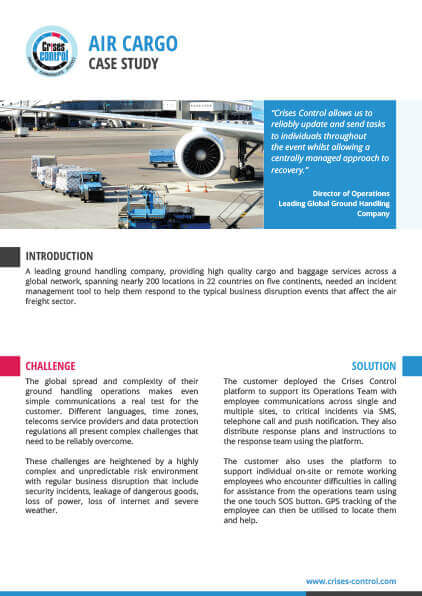Aviation Incident Management
Flying people and high-value cargo safely to their destination
Air travel will remain a preferred solution for the rapid, reliable and controlled transportation of time sensitive and economically perishable goods, as well as passengers. At the same time, the airline industry is subject to a wide range of predictable events that have the potential to disrupt its smooth operations.
When disruption events take place, airlines, air freight companies, ground handling agents and airport authorities, need to be able to respond quickly to alert and activate their response teams and provide them with instructions on how to resolve the problem. They also need to keep their supply chain and customers informed.
The risks that airlines, airports and air cargo operators are exposed to are numerous. These include:
- Severe weather
- Technical failure
- Unexpected demand
- Passenger delays
- Accidental damage to cargo
- Hazardous material spills
- Theft of valuable freight
A multi-channel communications platform will increase operational efficiency and maintain business continuity when traditional communications are saturated. Robust communication channels allow aviation operators to mitigate risks during critical events, gain competitive advantage and improve profitability.
Based near Heathrow Airport, Crises Control has a long-standing relationship with the aviation sector. Our platform enables operators to reliably communicate, update and send tasks to individuals throughout an event whilst allowing a centrally managed approach to recovery using real-time dashboards and map-based visualisations.
Crises Control can use geo-targeted notifications to:
- Notify ground handlers and pilots of critical incidents
- Alert airport response teams to severe weather conditions
- Alert airline passengers to travel delays and rescheduling
- Initiate business continuity and disaster recovery plans
- Initiate safety protocols around hazardous incident


Case Study - Ground Handling Company
A leading ground handling company, providing high quality cargo and baggage services across a global network, spanning nearly 200 locations in 22 countries on five continents, needed an incident management tool to help them respond to the typical business disruption events that affect the air freight sector.
The global spread and complexity of their ground handling operations makes even simple communications a real test for the customer. These challenges are heightened by a highly complex and unpredictable risk environment with regular business disruption that include security incidents, leakage of dangerous goods, loss of power, loss of internet and severe weather.
Crises Control allows us to reliably update and send tasks to individuals throughout the event whilst allowing a centrally managed approach to recovery.
Director of Operations, Leading Global Ground Handling Company
But what if something goes wrong or the equilibrium is disrupted?
All companies have heard of the saying – ‘fail to plan, plan to fail!’.
Contingency, continuity and risk awareness are all parts of efficient and pro-active business best practice.
Tools to facilitate the management of such disruptions to business as severe weather, security threats, accidents etc. are becoming ever more important.
During such events, organisations, authorities and people must respond rapidly to return to regular operations at the earliest possible time.
The period of time between disruption and normalisation can be a huge loss in revenues or reputation so the facilitation of organisation, standardisation and practical stepping stones through a structured and disciplined formal ‘tool’ is of immense value and importance.
Crises Control enables organisations to reliably communicate, update and send tasks to individuals throughout an event whilst allowing a centrally managed approach to recovery. Using real-time dashboards and map-based visualisations, organisations can view a clear status of users, tasks, incidents and notifications. This process and the key stages/steps help keep people safe and also accelerates the return to regular operations – “normalisation”.
IATA - Airline operators given 15 minutes to issue critical incident communications
The airline top priority is safety and safe operation. In the case of disruption to flight operation the highest priority is the rapid response and immediate launch of appropriate actions to restore operations as soon as possible.
Companies that fail to draw up appropriate alarm and emergency plans in preparation for serious incidents may be risking significant negative impact or may even lose their ability to operate altogether.

Is it time to take a closer look at Crises Control?
Partnering with top cargo and freight vendors, Crises Control has solved major challenges the industry is facing today, from meeting regulation and governance issues to providing operating instructions, clear task management and mass communications that enables a quick response to any event that may affect smooth operations.
Supply Chain Communications
Manage your critical supply chain and stakeholder communications in time of crises, using multi channel notifications. Crises Control gives you full control of the many notifications networks available so you can stay in control.
Reporting and Analytics
Our platform provides real-time dashboards, map-based visualisation and ad-hoc reporting to make sure you always know the status of your travelers and your infrastructure.
Workflow Automation
Automate your response team’s course of action according to the business continuity plan, quickly resolve any issue to cut expenses and get back on track as soon as possible.






